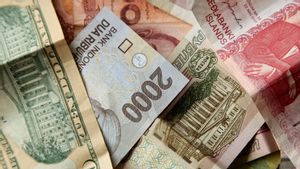YOGYAKARTA - For most countries in the world, independence day is an important moment because it celebrates the release from colonialism, oppression, or foreign power. But did you know that there are countries that do not have independence day? Curious? Listen to the end, yes!
The reason is, there are several countries that do not celebrate independence day for various reasons, from their own history to their current political status. This article will discuss some countries that do not do so and why.
1. Norway
Norway is one of the countries that does not have independence day, but celebrates Constitution Day on May 17. Even so, Constitution Day is not an independence day. In 1814, Norway declared independence from Denmark and drafted the constitution, but not long after that, they were forced to join Sweden. Norway finally separated from Sweden in 1905, but this incident was not commemorated as independence day.
On the other hand, Constitution Day focuses more on historic moments in Norway's politics, namely the preparation of the constitution and the revival of the spirit of nationalism. Even though Norway has been independent, May 17 remains a major celebration for the nation.
2. Australia
Australia has no independence day because of its history as a British colony that later developed into a Commonwealth country. In 1901, Australia became the British Dominion through a federation process, which gave the country full autonomy in many aspects of government, although it continued to have close relations with Britain and maintain the King or Queen of Britain as head of state.
Australia's National Day, which falls on January 26, commemorates the arrival of First Fleet from England in 1788 and the establishment of Australia's first British colony. Although some consider this date controversial and suggest changes, Australia still does not have a date that is considered independence day from foreign powers.
3. Canada
Like Australia, Canada also does not have independence day in a conventional sense. Canada is a former British colony that reached Dominion's status peacefully in 1867 after the signing of the United Kingdom's North American Law (British North America Act). Canada later received full autonomy in domestic affairs and gradually gained complete sovereignty, including the right to amend its constitution without British approval, which was only realized in 1982 through the signing of the Canadian Constitution.
Canada celebrates Canadian Day every July 1, to commemorate the formation of the country as Dominion. However, today is not considered an independence day in the context of the release from colonialism or foreign power.
SEE ALSO:
4. New Zealand
New Zealand also has no specific independence day. Like Australia and Canada, New Zealand was part of the British Empire and acquired autonomy in stages and peace. In 1907, New Zealand became the British Dominion, and throughout the 20th century, the country acquired full autonomy in stages.
Waitangi Day, which was celebrated on February 6, is the main national day in New Zealand. Today commemorates the signing of the Waitangi Agreement in 1840 between the British Empire and the M Wayori tribe, which marked the beginning of colonial rule in New Zealand.
5. UK
Britain has no independence day because of its long history as a colonial state and a center of power. In modern history, Britain has never experienced colonialism by other countries, so there are no moments that are considered as liberation from colonialism.
On the other hand, Britain was the colonial force that founded the United Kingdom which was vast and controlled many regions around the world. As an imperialist country that controls other nations, Britain has never been colonized by foreign powers in modern history. They celebrate national events such as the birthday of the king or queen, as well as various historical warnings that have marked the country's development.
6. Scotland, Wales and Northern Ireland
Like England, Scotland, Wales and Northern Ireland, which are part of the United Kingdom also do not have independence day. Although their history is colored by conflict and annexation by Britain, these three regions remain part of the United Kingdom, despite the different level of autonomy.
Scotland used to be an independent country until unification with Britain in 1707 through the Acts of Union. Wales has been integrated with Britain since the Middle Ages, and Northern Ireland is still part of the United Kingdom, although most of Ireland gained independence in 1922.
Although there is a political movement that wants full independence, especially in Scotland, these three regions are still part of the United Kingdom and do not have a special day to commemorate independence.
7. Denmark
Denmark is another country that does not celebrate independence. Like Britain, Denmark has never been colonized by foreign powers in modern history. Although the country is involved in several wars and conflicts, such as with Sweden and Germany, Denmark has not experienced direct colonialism.
Denmark, as one of the oldest monarchys in the world, has a stable government system for centuries. Danish citizens preferred to commemorate national events such as Constitution Day which falls on June 5, to commemorate the signing of the country's first constitution in 1849.
Talking about the country, by the way, there is a list: A Comfortable Country For Backpackers
So after knowing a country that does not have independence day, see other interesting news on VOI.ID, it's time to revolutionize news!
The English, Chinese, Japanese, Arabic, and French versions are automatically generated by the AI. So there may still be inaccuracies in translating, please always see Indonesian as our main language. (system supported by DigitalSiber.id)

















